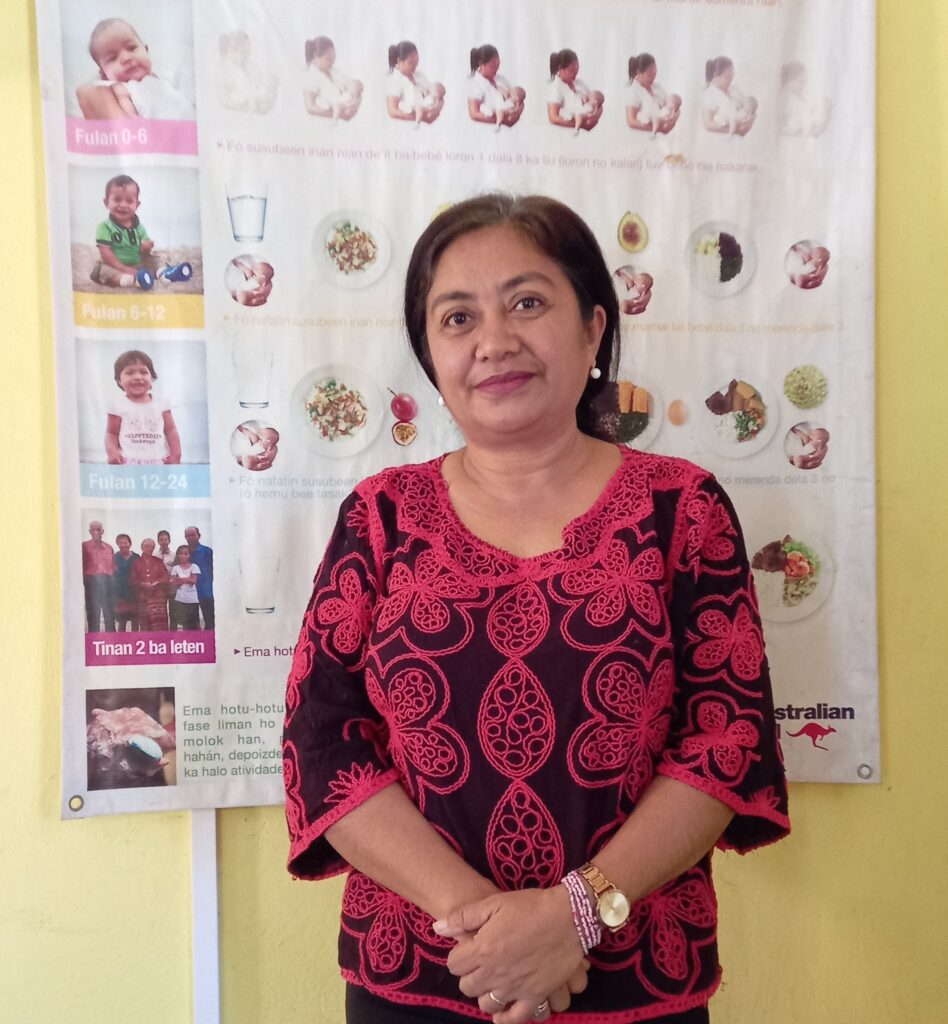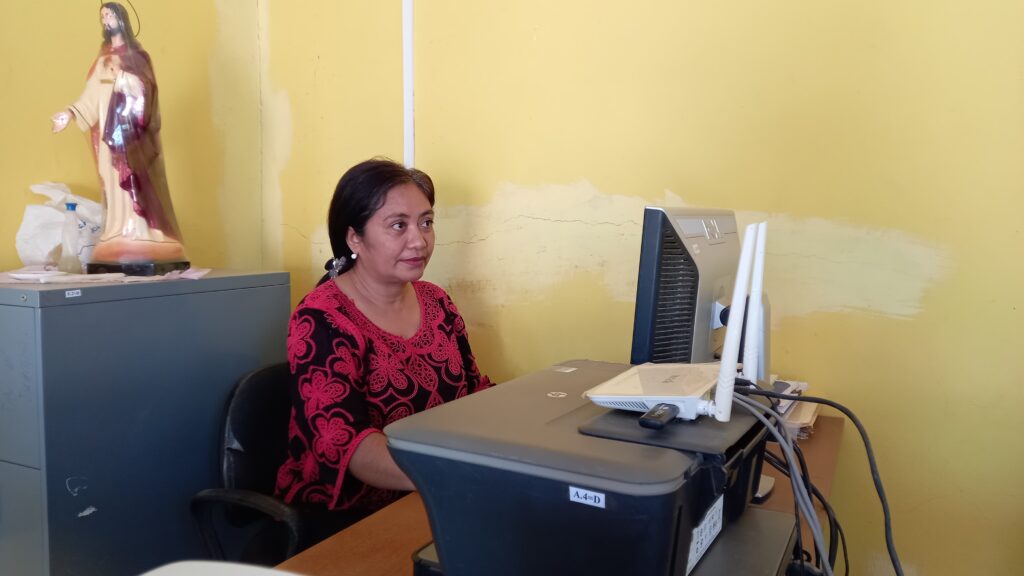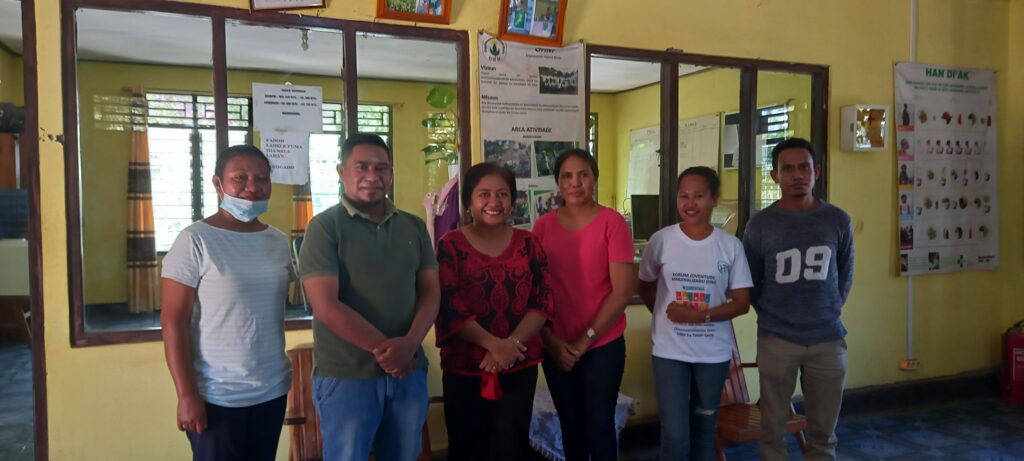[English Below]
Emirenciana Nipu, kaben na’in no iha oan na’in 5. Emirenciana ho nia família hela iha Munisípiu Bobonaro.
Nia mak sai hanesan fundadór no oras ne’e daudaun assume responsabilidade hanesan diretora ezekutiva ba Fundasaun Haburas Moris (FHM) ne’ebé lokaliza ninia eskritóriu iha munisípiu Bobonaro. FHM estabelese in tinan 2004 no halo nia operasaun iha Munisípiu Bobonaro ho foku ba hasa’e ekonomia feto sira nian iha liuhusi estabelese no fó formasaun ba grupu agrikultór no agro-negósiu feto sira hamutuk 98 no to’o ohin loron FHM sei nafatin akompaña grupu sira no sosa sira-nia produtu hodi ba fa’an fali Dili.
Mezmu hasoru dezafiu oioin maibé nia konsege asina ona akordu fa’an no sosa ho Restaurante Dilicious no Loza Amigu To’os Na’in iha Dili hodi fa’an produtu lokál foos mean no metan ne’ebé prodús husi grupu agrikultór sira ne’ebé nia rasik estabelese no jere.
Iha sira-nia Suco, labarik sira bele asesu ba eskola ne’ebé besik liu ho la’o ain durante oras ida no inan ho aman tenke akompaña tanba labarik sira tenke hakat liu estrada ne’ebé laiha sinais tránzitu. Komunidade sira mós bele asesu ba klínika ho distánsia la’o ain minuta 30, inklui asesu mós ba ospitál referral ho la’o ain durante oras ida. Dala ruma sira uza ojek motorizada tanba laiha tan transporte public seluk ne’ebé halo operasaun iha fatin refere.
Nia hatete, komunidade iha fatin bele asesu ba bee moos ne’ebé governu fornese maibé família ida-idak tenke selu ho valor $.4.00 to’o $12.00 kada fulan depende ba utilizasaun. Maibé iha tempu bailoro difisil tebes asesu ba bee moos no komunidade tenke ba hariis, fase no kuru bee mota ho distánsia kilómetru ida.
Kona-ba situasaun ekonomia iha Suco ida-ne’e, Emirenciana hateten katak komunidade Lahomea maioria hetan osan husi negósiu ki’ik no fasil asesu ba merkadu tanba besik. Grupu sira lori sira-nia produtu hanesan forekeli, foos mutin, foos mean, foos metan no fore-rai, modo no produtu seluk tan ba fa’an iha merkadu no baibain sira bele hetan osan husi $10.00 – $50.00 kada loron maibé daudaun ne’e sira hetan rendimentu menus liu.
Nia hatutan, “ami fó formasaun ba komunidade liu-liu grupu kona-ba oinsá jere sira-nia rendimentu, porezemplu fa’an dala ida hetan osan $.10.00, tenke koloka $ 5,00 ba sosa fali produtu ka uza hanesan kapitál, no $.3.00 rai iha sira-nia grupu (tabungan), $.1.00 uza ba sosa modo ka buat ruma hodi han no $.1.00 hodi selu rasik sira-nia aan ka hanesan saláriu ba sira-nia aan rasik”.
Ami mós akompaña grupu sira no halo oráriu ba sira hodi lori sira-nia produtu ba fa’an iha merkadu lokál sira iha postu seluk inklui ba fa’an iha munisípiu Ermera tanba fa’an de’it iha sira-nia fatin ladún folin.
Tuir nia, dezafiu ida mak maioria produtu ne’ebé lori ba hatama iha supermerkadu sira ida Dili rai de’it (titip jual) no mai foti fali osan bainhira ema sosa hotu ona no bainhira ema la hola hotu to’o besik ona data prazu remata nian sira tenke mai foti fali no lakon osan ba transporte dala ida tan.
Dezafiu seluk mak sira hasoru problema hanesan feto tanba tenke halo viajen iha tempu kalan ho distánsia dook hodi lori produtu husi Maliana ba Dili no tenke halo viajen durante oras 4 to’o oras 5 iha karreta laran iha tempu kalan no bainhira produtu la folin tenke fa’an ho folin baratu atu bele selu karreta hodi fila fali.
Nia hatutan, katak nia iha vontade di’ak atu hadi’a moris liuhusi promove produtu lokál no iha kometimentu atu kontinua liga produtu lokál ba fa’an iha merkadu, no organizasaun prontu kontinua akompaña grupu sira kuda ho eskalaun boot hodi hasa’e kuantidade produsaun maibé problema maibé nia observa katak sei presiza fó tan formasaun no halo aproximasaun ba grupu sira atu hatoman aan fa’an ho kilograma tanba asesu ba merkadu formál sira presiza hola produtu ho osan tuir ninia kilograma atu nune’e fasil atu kalkula osan tama no sai.
Organizasaun hanoin ona atu estabelese sentru koletór produtu lokál iha kada Suku alvu, koordena ho Xefe Suku sira atu hafasil no atrai sosa na’in sira aumezmu tempu hamenus mós preokupasaun grupu nian kona-ba menus transporte hodi lori produtu ba merkadu.
Ami mós hanoin atu hasa’e kualidade embalajen ka kemasan hodi atrai liután sosa na’in sira no hanoin mós atu iha transporte rasik hodi rekolla produsaun husi grupu sira ba fa’an iha Dili, no husu apoiu husi ajénsia ka organizasaun internasionál ruma atu fó apoiu hodi fó sai rezultadu produsaun liuhusi media hanesan televizaun no seluk tan hodi halo promosaun ba produtu ne’ebé FHM ho ninia grupu sira prodús.
Rekomenda ba governu atu halo sensibilizasaun ba to’os na’in sira, hodi hatoman komunidade fa’an produtu ho maneira tetu no tau presu kada kilograma.
Nia kontente no espera katak ho ADRA TL nia prezensa liuhusi projetu Hakbi’it Feto (finansia husi Uniaun Europeia no finansia husi ajénsia dezenvolvimentu austria no ADRA austria) bele hadi’a di’ak liután kualidade no hasa’e kuantidade produsaun no mós asegura asesu di’ak liu ba merkadu.
The Foundation of Fostering Life (FHM)
Emirenciana Nipu, married with 5 children. Emirenciana and her family live in the Munisípiu Bobonaro.
She is the co-founder and right now holding the responsibility as the executive director of Fundasaun Haburas Moris/FHM (The Foundation of Fostering Life) with an office in Bobonaro Municipality. FHM was established in 2004 with a focus on improving women economic empowerment through training women farmers’ and the establishment of agri-business groups with the total of 98. Currently FHM accompanies the groups and buying their products for selling in Dili.
Despite facing many obstacles, Emirenciana was able to establish a contract with Dilicious Restaurant and Amigu To’os Na’in for selling black and red rice which is produced by the groups FHM established.
At their village, the children have to walk for an hour to reach the nearby school, and the parents have to accompany them because they need to cross the road without traffic signs. The community has access to a medical clinic 30 minutes by foot, including accessing a referral hospital an hour by foot. Sometimes, they use motorcycle taxi because there is no other public transport operating in this village.
She said, the community in this village can have access to clean water provided by the government and each family should pay $.4.00 – $.12.00 per month depending on how much they use the water. However, it is difficult to access to water during the dry season and the community usually go to wash, bathe and collecting water from the river one kilometer away.
The majority of the community in Lahomea have the main income from small business because they can have easy access to the local market. The groups bring their commodities like soybean, black, red and white rice, peanut, and other crops for selling at the market and usually receive the income of $10.00 – $.50.00 per day, but recently they have had less income.
She added that, “we trained the community, especially the groups, on how to manage their own income, for example: if they do one selling activity and received $.10.00 income, they should put $.5.00 as capital to buy seed or other commodities, $.3.00 for saving in the group, $.1.00 for buying vegetable or anything to eat and $.1.00 as salary for paying themselves”.
We also provide mentoring and help them set up schedule for the group to bring their products to sell at other local markets at other administrative posts including selling in Ermera municipality because not many buyers come to buy their products when they only sell them at the one local market.
Another challenge that she faced is that most of the agricultural products brought to the Supermarkets in Dili were just left at the supermarkets for selling (deposited) than they come back to collect the money once the items are sold. If not all the product is sold then they should collect them back when it close to the end of the expiry date requiring the hire of transport once again. All the risk is taken by the farmers groups.
Another challenge the women face is that they need to travel during the nighttime with long distance to bring the products from Maliana to Dili and need to travel for 4 – 5 hours by car at night and if the products not sold, they sell with lower price so that they can pay the transport to come back.
She added that she has the good will to promote local commodities and has the commitments to link the local products to the market, and the organisation is ready to provide mentoring for the groups and encourage them to plant in bigger scale in order to increase the quantity; however, she also observed that the groups still need more training and approach to selling the commodities in kilogram because when accessing to formal markets they need the price per kilogram and it will be easier for the groups to calculate the income and spending.
This Foundation is planning to establish a collector center for local commodities from each targeted village in coordination with Chefe Suco in order attract the buyers and also reduce the groups challenge with less access to transport to bring their products to the market.
FHM are also planning to improve the quality of packaging to make it look more attractive to the customers and are planning to have their own transport to collect the products from the groups and sell them in Dili. We also call for government agency and international agencies to support in promoting the local products through mass media like TV and others to introduce the products produced by FHM and its group members.
She recommended to the government to help in sensitizing the community, especially farmers to sell their products using scales and give price per kilograms.
She is happy and has hope with the presence of ADRA TL through Hakbi’it Feto project (funded by the European Union and co-funded by the Austrian Development Agency and ADRA Austria) could improve the quality and quantity of the production and ensure better access to the market.








